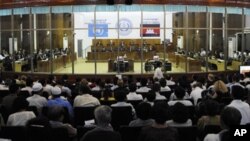The investigating judges for the Khmer Rouge tribunal on Thursday issued a strong denial the UN-backed court was heading for a “crash,” as they faced increasing criticism for their work on controversial Case 003.
The biweekly International Justice Tribune said in a May 23 article the investigating judges were in a “spat” with the international prosecutor and quoted sources warning of a “crash” or “collapse” of the multimillion-dollar court, which has so far only prosecuted one Khmer Rouge leader.
In a statement Thursday, the judges, Siefried Blunk and You Bunleang, called that analysis “baseless” and “nonsensical,” saying the court was moving forward toward more prosecutions.
The two judges have faced increasing scrutiny after they issued a concluding order to Case 003 in April. In a subsequent statement, international prosecutor Andrew Cayley said he would appeal the order and request further investigation.
The judges ordered Cayley to retract certain portions of that statement, which they claimed were confidential, an order Cayley has said he will refuse and appeal.
The Tribune said the judges threatened the prosecutor with contempt of court, a claim the judges strongly denied as “a malicious rumor.”
“The Co-Investigating Judges have worked independently from outside interference, will continue to resist all such attempts, and are resolved to defend their independence against outside interference, wherever it may come from,” the judges wrote.
However, the judges are facing mounting public criticism that they failed to properly investigate the case, including failure to interview the two prime suspects, whose names remain confidential.
Prime Minister Hun Sen and other Cambodian officials strongly object to the prosecution of cases 003 and 004, which could mean indictments of up to five more Khmer Rouge leaders. Some observers say such opposition, echoed by some court officials, point to political interference at the tribunal.
“Critics noted that investigators did not interview the suspects during 20 months of investigation into Case 003,” the Tribune reported. “Nor did they visit alleged crime sites. Some interpreted these facts, along with the secrecy surrounding the case, as signs of an internal decision to scuttle the case.”
Tribunal spokesman Dim Sovannarom said the article was “unacceptable,” claiming the investigating judges had been focusing on the tribunal’s first two cases, the latter of which is scheduled for hearing later this year.
The public statements from both the judges and the prosecutor have done little to allay concerns that cases 003 and 004 will not be seen through to the end.
“Until an exit strategy is decided upon and finalized, the court is obligated to continue its work,” said Alex Hinton, executive director of the Center for the Study of Genocide, Conflict Resolution and Human Rights.
“It is critical that the different branches of the court continue to fulfill their duties even if the future is uncertain,” he wrote in an e-mail. “While many people would like to see cases 003 and 004 take place, the investigation itself is important regardless, since it will still help provide a clearer understanding of what took place during [the Khmer Rouge], particularly with regard to the echelon of leaders slightly below those now on trial in Case 002.”
Clair Duffy, a tribunal monitor for the Open Society Justice Institute, said the investigating judges have “extensive legal and moral obligations to fully investigate the very serious allegations against all suspects in cases 003 and 004.”
“This is not about politics,” she said. “This is about justice—justice Cambodians have been patiently waiting for for over 30 years now.”
“If the court shields people from legal accountability for mass atrocities, and meanwhile some of its judges are influenced by political pressures, the court’s legacy in both respects will be marred,” she added.
Author and professor Peter Maguire, meanwhile, said the tribunal is facing a threat to its legitimacy.
“If the [tribunal] cannot finish the next case during the defendants’ lifetimes,” he said, “the Cambodians would have been better served by a moto-taxi tribunal.”
The court is also facing criticism that is has not done enough to inform Cambodian victims about cases 003 and 004.
“It is critical for the court to provide adequate time for civil parties and complainants to file their applications,” Hinton said. “This is part of their trial rights.”
However, he said, even if a failure to complete cases 003 and 004 “would diminish the legacy of the tribunal somewhat, the symbolic and judicial importance [of cases 001 and 002] should not be underestimated.”




